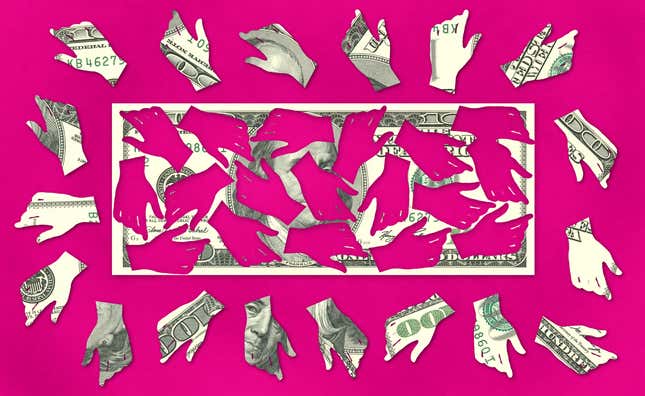
A reader asks:
As someone about to graduate college, do I focus on helping people or do I focus on money? I’ve considered teaching or something along those lines in order to have a direct impact on people. The thing is, it seems that the only people that really make an impact these days are the people with money, who can use that for influence. No pressure, but my post-college life could be influenced by this answer.
I didn’t intend for this Thanksgiving edition of Ask An Adequate Woman to be especially thematic, but I’m starting to think that one can remain appropriately agitated about the state of the world while taking time to appreciate a genuine attempt at positivity. So. I’m going to resist cynicism and self-defeating futility in the face of what I hope is earnest altruism.
You’ll be faced with countless binary choices throughout your working life, but the overall shape of your career is not one. This makes my job easier in some respects—if you asked me whether you should reject a specific low-paying teaching job in favor of attending a specific law school intending it to result in oodles of money, I’d balk at issuing any definitive ruling without a comprehensive consideration of your personal finances and future priorities. I can, and do, encourage you to find a balance as best you can, which will be borne out by the many incremental decisions you make as your experience and priorities grow. But I understand that a lot of adulthood is actually a matter of closing doors so can you focus on the opportunities in front of you and also that “balance” is only not bullshit insofar as it differs from “having it all.”
Assuming a certain level of gainful employment (which perhaps is not totally fair to take as a given except that we’re operating under the assumption that your career is a matter of choice) your priorities, and a willingness to budget accordingly, will go a lot further towards determining whether or not you regularly donate money. To a certain point, giving what you can is noble in a thankless, drop-in-a-bucket-of-hopefully-many-drops kind of way. Of course $200 to Planned Parenthood would have gone twice as far as the $100 I thought I could reasonably afford to give in the wake of the election. But neither buys me any more influence than the number of procedures that cash will cover.
But you’re not concerned with just making occasional, anonymous donations. And you’re right that wealth affords you a certain amount of influence that a person such as yourself could use for the greater good. Except, here’s the catch: That kind of money can’t be assumed. Of course there are career paths that pay better than others but “become rich” is not an especially actionable goal absent any particulars. Maybe there aren’t that many benevolent billionaires because all the real altruists followed similarly flawed advice and went into low-paying social work gigs. But more likely it’s just that there aren’t that many billionaires at all—and to become one often requires a certain ruthlessness that runs counter to the kind of values you’d hope to propagate with your obscene wealth. Forgoing the chance to help people in your community because you’re banking on one day being Bill Gates seems more likely to leave you unfulfilled personally and less beneficial in the long run than if you had just donated both the smaller amount your salary affords and your on-going time and energy.
This is not an blanket entreaty to always take the lower-paying prospect. I can’t give you comprehensive career advice in part because you didn’t give me much to go on (seriously, bud, give a girl some details) and in part because I’m unqualified to do that even for myself. I love being a writer despite the notoriously small salaries. That said, I wouldn’t love it as a career if it didn’t allow me to support myself. Right now it works. But I want a family. And to own a home with more than six square inches of counter space. I need money to make those things happen. I don’t know exactly how I’m going to get there, but along the way there will probably be some selling out or some scrimping to get by. And I know, your hypothetical greed is less self-centered, but the point still stands: You don’t determine your future net worth by a single decision made at 22. Get good at something, get worldly and informed and experienced and feel free to follow the money if you find yourself stymied by lack of funds in the future. But first figure out what it is you want to do.
Maybe you’ll teach for 10 years in a low-income neighborhood and eventually decide that you need to take a higher-paying opportunity at a fancy private school to give yourself a greater sense of financial standing and security. That won’t negate all the good work you’ve done, and you can take your charitable spirit with you. Maybe you’ll burn out faster than that, go back to grad school to get an advanced degree so you can try to serve your community from a corporate setting. Maybe you have a knack for nonprofit management and will move up quickly to a position of moral and influential capital. (I’m sure these sound like laughable oversimplifications of career tracks to anyone working in those industries but that’s sort of the point.) Not to get too touchy feely about it all but: No matter what you do you’ll be making a “direct impact” on everyone with whom you come in contact. If you put yourself in a position to provide a necessary service to those who seem to need it most, your work will be impactful in a very positive way.
Got a question? Here’s our email.